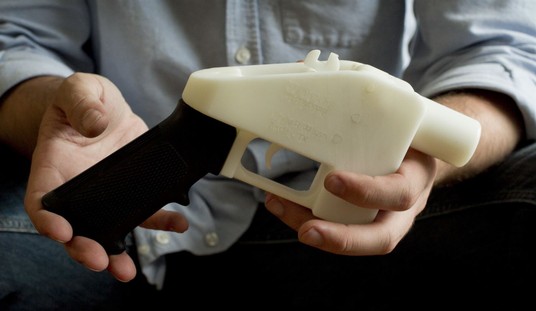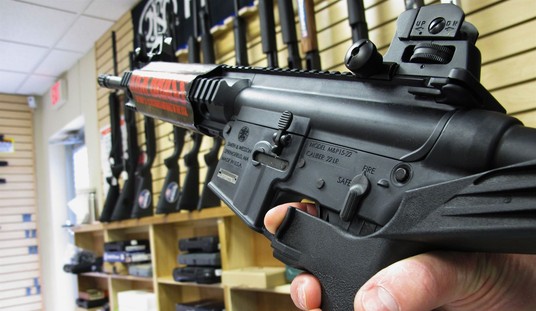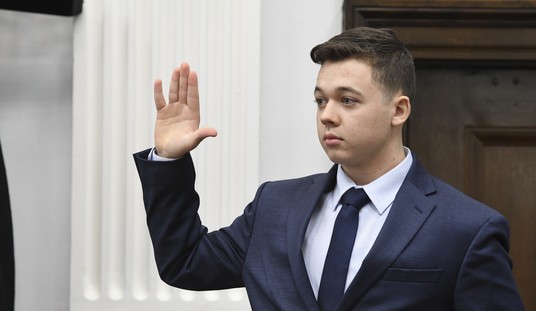At some point over the next month, the Supreme Court is expected to release its opinion in Smith & Wesson vs. Estados Unidos Mexicanos; a challenge to Mexico's lawsuit against many major U.S. gun makers that has been rejected by lower courts but upheld by the First Circuit Court of Appeals.
I anticipate that a majority of the Court will rule that Mexico's lawsuit is forbidden by the Protection of Lawful Commerce in Arms Act, and if that does come to pass we're likely to see a flurry of editorials bemoaning Mexico's inability to hold gunmakers responsible for the crimes of the drug cartels. We'll also probably see plenty of commentary about the difference between U.S. gun laws and those south of the border, with many media outlets taking the position that Mexico's gun laws are just "common sense."
Over the weekend the New York Times gave us a bit of a preview, in a piece exploring the process of legally buying a gun in Mexico, which can only take place at two gun shops in the country, both of which are located on military bases.
The Constitution enshrines the right to own them, and there are millions of weapons in civilian hands, with a black market flooded by American-made guns. But the two legal stores, military-run and tightly regulated, are emblematic of government efforts to better control Mexico’s guns.
Private security guards, sport shooters and others make strenuous trips to the stores, which look like a cross between a D.M.V. office and a small museum. Applicants need to present nearly a dozen documents at the stores — once they’ve waited a few months for approval to buy a gun.
Cristian Ulices Ocaranza Marquez, 32, a municipal police officer, rented a van with six other officers and drove eight hours from his home to Mexico City for guns. His state, Colima, has one of the highest homicide rates in the country, and he is barred from bringing his work gun home, so he applied for a handgun, waited three months for approval and paid $518. (The average monthly salary in Mexico is roughly $320.)
“Because of this job, my family is also in danger,” said Mr. Ocaranza Marquez, a father of two young children.
At least Mexico is consistent when it comes to its gun control laws, unlike in the United States where law enforcement is routinely exempted from things like "assault weapon" and magazine bans as well as "gun-free zones". But as the NYTimes story makes clear, those gun control laws south of the border are doing far more to prevent lawful ownership of firearms than stopping the black market sale and acquisition of guns.
IDs must be checked and logged. Visitors pass through a metal detector and have their photo taken on the way in and out. Cellphones are left at lockers. Documents are checked at the door. Roughly 125 customers visit every day, while a quarter of that number visit the newer Monterrey store, officials said.
The documents include a gun acquisition form, proof of no federal criminal record, medical and psychological evaluations, a drug test, proof of your residence and employment, copies of your identification, birth certificate, tax number and, if applicable, your membership in a shooting club. There is also a $25 fee.
“If every supplier had a store in every state, who would have control?” said Col. Jesús Alfonso Nava Bustamante, who until recently oversaw approvals for buying a gun. “We maintain it here.”
The process has many requirements on purpose, he said, because, if not, “anyone would be armed.”
Which they supposedly have the right to do under Mexico's constitution.
Mexico's homicide rate is far above that of the United States, even though our "lax" gun laws are routinely blamed for violence south of the border. Criminals, including the cartels, can acquire weapons with ease; whether its through U.S.-based gun trafficking rings, corrupt Mexican military and law enforcement, or through the scores of black market weapons available from Central and South American stocks. In fact, based on the comment by one legal customer who spoke to the Times, it appears that guns are readily available to those who want one for personal protection, so long as they're willing to pay a premium.
Eduardo Ignacio García Zavala, 32, who works in insurance but is a sport shooter on the side, had gone to the Mexico City shop to add a new precision rifle to his collection — and said he wished Mexico had the variety of weapons and calibers that were available in the United States.
Still, Mr. García Zavala said he would rather buy from the military than on the black market. And one reason is cost: He said the rifle he bought would have cost four times more on the black market, a calculation that can help counter the lure of the unregistered route.
“Acquiring a gun legally is very satisfying because I know I’m doing things right,” he said. “But there’s also a fear that you go out there, on the street, and anyone could be armed.”
Mexico's restrictions on gun ownership haven't impacted the cartels in any meaningful way. Instead, it's the average citizen who feels the effects of the draconian gun controls. From having to pay more than a month's average salary, waiting weeks on end for approval, and being forced to travel to one of just two gun shops in the entire country, would-be gun owners in Mexico are faced with a host of challenges that are designed to prevent them from exercising a right guaranteed them by their country's constitution.
As one former government official told the Times, “it’s good that it doesn’t look good" to own a gun. That's only the case if you think it's good to stop people from being able to protect themselves from the armed thugs who prey upon the Mexican citizenry. Mexico is one of the best examples of the inherent futility of gun control; a heavily-armed criminal syndicate that threatens civil society, and a body of law-abiding citizens who are largely helpless to resist unless they too are willing to break the law in order to acquire the means to protect themselves and their family.









